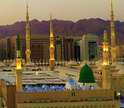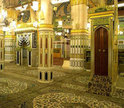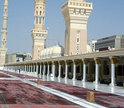Rain by means of his prayer
Arabia was once affected by terrible famine. The people of Makkah intended to pray to idols but a beautiful old man advised them, saying: ‘O people of Makkah! Abu Taalib is present among us. He is a descendant of the founder of the Holy Ka’bah, Sayyiduna Ibraheem عَـلَيْـهِ الـصَّلٰوةُ وَالـسَّلَام, and is also the custodian of it. We should go to him and request him to pray.’ Therefore, Arab chiefs came to Abu Taalib and requested him in these words: ‘O Abu Taalib! The fire of famine has engulfed entire Arabia. Animals have no grass and water to eat and drink and humans are dying of starvation. Caravans no longer come here. There is destructiveness everywhere. Please pray for rain.’
Hearing the request made by the Arabs, Abu Taalib became very sad. He then took the Holy Nabi صَلَّی اللّٰہُ تَعَالٰی عَلَیْہِ وَاٰلِہٖ وَسَلَّم with him to the Haram of the Ka’bah and sat him leaning against its wall. He then busied himself with prayer. During the prayer, the Holy Nabi صَلَّی اللّٰہُ تَعَالٰی عَلَیْہِ وَاٰلِہٖ وَسَلَّم lifted his blessed hands towards the sky. All of a sudden, clouds appeared from all directions and the rain of mercy poured down. In plains and jungles, there was water everywhere. Barren deserts turned into meadows. In entire Arabia, famine and starvation were replaced with prosperity and well-being.
In his long poem, Abu Taalib wrote in praise of his nephew and our Holy صَلَّی اللّٰہُ تَعَالٰی عَلَیْہِ وَاٰلِہٖ وَسَلَّم , he wrote a couplet, referring to the above parable:
وَ اَبْیَضَ یُسْتَسْقَی الْغَمَامُ بِوَجْھِەٖ ثِمَالُ الْیَتَامِیْ عِصْمَةٌ لِّلْاَرَامِلِ
Translation: He صَلَّی اللّٰہُ تَعَالٰی عَلَیْہِ وَاٰلِہٖ وَسَلَّم is [beautifully] white-faced. People are blessed with rain from clouds by means of his beautiful face. He is a great help to orphans and widows.1
(Zurqaani ‘alal Mawahib, vol. 1, pp. 190)
1Sharh-uz-Zurqaani ‘alal Mawahib, vol. 1, pp. 355













